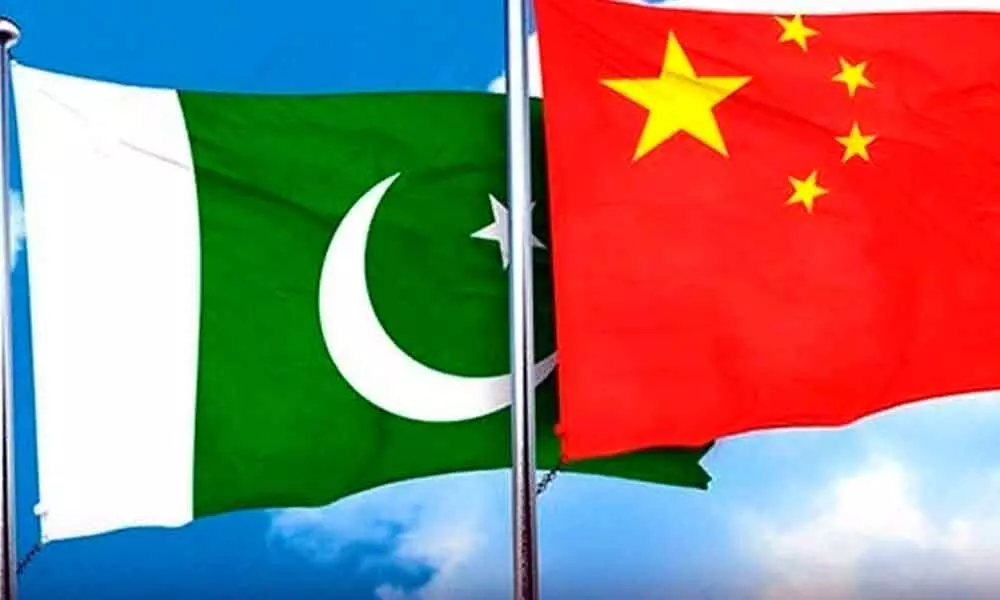The cat and mouse game of China, Pakistan
They are allies but not in an alliance
image for illustrative purpose

China-Pakistan relations have been described by many political leaders of both countries with platitudes like 'all weather', 'iron brother' or 'higher than the mountain and sweeter than honey' at various stages of their relationship.
In recent years, China has increasingly leaned on Pakistan in South Asia and the Indian Ocean Region to propagate its foreign, economic and military policies through various initiatives, such as CPEC, BRI etc.
Michel Berkley of the Belfer Centre at Harvard University has succinctly identified the main interests that China has in Pakistan; firstly, preserve Pakistan as viable military competitor to India; secondly, use Pakistan as an overland trade and energy corridor; and thirdly, use Pakistan's cooperation in severing links between Uighur separatists in Western China and Islamists in Pakistan.
Quite clearly, China looks at Pakistan as a supporter, a facilitator and promoter of her national interest. More recently, this relationship has been witnessing a deeper understanding and transforming into a strong military relationship. Yet what defies reason is - why does China refuse to sign an alliance with Pakistan?
Historical Background
Pakistan began flirting with China after 1962. Ayub Khan realised that the US was not a credible ally, more so when the US agreed to support India after the 1962 Sino-Indian war. Pakistan was unable to capitalise on a weak India. The Treaty of Shaksgam in 1963, wherein Pakistan parted with 5,180 sq km of territory of the erstwhile Indian state of Jammu and Kashmir (now UT of Ladakh), set into motion the beginning of a deep and mutual relationship based almost entirely on the classic policy of balancing - 'my enemy's enemy is my friend'.
Over the last five decades, Pakistan has been a reliable ally to China. China has never forgotten the role of former Pakistan President Yahya Khan as the messenger between US President Richard Nixon and Mao Tse Tung which resulted in the US-China rapprochement in 1970. Ever since, Pakistan has been a staunch supporter of China in the Organisation of Islamic Countries (OIC), fending off any anti-China sentiments, especially with reference to Chinese atrocities in Xinjiang.
The OIC, a powerful grouping of 57 countries, has surprisingly been a mute spectator to the horrors perpetuated by the CCP on the Uighurs and Sinicisation of Xinjiang. Pakistan has also been an ardent supporter of China in the United Nations, providing unwavering support to China during the crisis in South China Sea and in its 'One China' policy on Taiwan.
In return, Pakistan has benefited from the Chinese largesse. As Chinese aspirations of global power gained traction, her expanding footprint in South Asia made Pakistan the centre of its South Asia policy. Pakistan supported Chinese entry as an observer in SAARC which was reciprocated by Pakistan's entry into SCO. The flagship Belt and Road Initiative (BRI) of Xi Jinping had become the cornerstone of Chinese economic policy, coupled with a military strategy of increasing its global footprint in Asia, Africa and Europe.
Among the six sub-initiatives that comprise the BRI, the most successful has been the China-Pakistan Economic Corridor (CPEC), which is entirely routed through Pakistan and the UT of Ladakh. The $64 billion CPEC has already become an issue of contention within Pakistan. Falling short of targets and wracked by incessant attacks on Chinese engineers, staff and assets by Baloch nationalists and Gilgit-Baltistan based local groups, China has put pressure on Pakistan to ensure its success.
Gwadar, by its location, provides a strategic outpost to China to monitor the Straits of Hormuz which has the US Third Fleet based in Bahrain and Indian Navy's Western Command on its western seaboard. Despite all these mutual interests, China has still not signed an alliance with Pakistan. That clearly sends two messages to the environment:
• China does not want to make any binding commitment to Pakistan. Financial, military equipment, diplomatic support is a 'Yes' but direct intervention and sending Han Chinese body bags for Pakistan's cause is a big 'No'.
• China does not trust Pakistan as a reliable ally. The Chinese continue to be cautious about the all powerful Pakistan Army and the chaotic political landscape in Pakistan. Many Chinese argue that China does not believe in the alliances, yet Chinese have signed a binding treaty with North Korea in 1961. And they are fully committed to that alliance.
(The writer is a columnist who writes on internal security issues)

